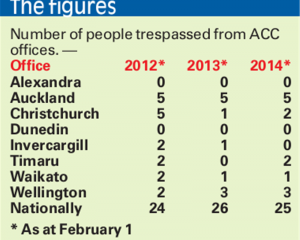Unless it is a statistical blip, evidence points to procedures within ACC's Sensitive Claims Unit having radically altered.
Figures show 32 sexual-abuse claims for counselling were approved in the first two months this year, compared with 472 in January and February 2009.
That is not far off a tenfold decrease.
And, on Monday last week, ACC Minister Nick Smith announced the way the corporation managed the claims of sexual-abuse victims was to be reconsidered.
To this end, he named a panel to undertake a "clinical review to ensure best possible practice in this sensitive area".
It is, of course, possible that the figures for 2009 were uncharacteristically high, or perhaps amplified in some way shape or form, but - much as it would be desirable - it is almost impossible that a dramatic fall-off in actual instances of sexual abuse a year later could account for such a wide discrepancy.
The conclusion must be that changes to the way in which ACC handles such claims, introduced in October last year by Dr Smith, have been responsible for the drop.
On the one hand, this will undoubtedly be helping to meet the savings of which the minister has made something of a mantra; on the other, it could mean that the changes have been "overcooked", laying the minister open to charges of callousness and injustice.
Labour's ACC spokesman, David Parker, was quick to oblige in this respect, saying that Dr Smith had "failed victims of sexual crimes".
Dr Smith firmly rejects a fiscal motive, insisting that the changes were never about "cost savings" and that he has "repeatedly stressed to the corporation that the focus must be on delivering to victims of sexual abuse or assault . . . the best help available to achieve a timely and successful recovery."
This much is politics.
In fact, it appears the guidelines were developed and launched in March 2008 under the previous Labour-led government.
What is less clear is the extent to which these were then altered or finessed under Dr Smith's purview.
Regardless, there were certainly warnings from the counselling professions before the introduction of the changes last year that they were poorly conceived and potentially dangerous to victims.
Notwithstanding an inevitable degree of self-interest in such protestations, valid points were made at this time.
Among these was perhaps the critical intervention that every client have a psychiatric diagnosis to determine "mental injury" and thus eligibility for ACC-funded counselling.
There are, of course, victims who might struggle and require help in the aftermath of sexual abuse who do not show the precise symptoms of recognised psychiatric diagnoses such as depression, anxiety disorders or post-traumatic stress disorder who might previously have qualified but who under the new regime now do not.
This will be a profitable area of study for Dr Smith's new panel, which will want to establish guidelines that strike a balance between a necessary degree of rigour in assessing the validity of claims but also make sure that genuine cases receive appropriate care.
The announcement of the review comes on the heels of publicity concerning the possible privatisation of some ACC provisions - a motive long ascribed to the Government by its critics, who suggest that any such move would be to the benefit of the mainly Australian insurance companies likely to be involved, and to the detriment of ordinary citizens, particularly the elderly, who tend to claim most and be hit hardest by age-related premium increases.
These are familiar objections and pay little heed to the constant necessity to find new ways of managing the burgeoning costs of ACC.
There is nothing wrong with private provision in and of itself - indeed it should be looked into - as long as it can be shown that it works to the benefit of New Zealanders.
Following an interim report by the ACC Stocktake Steering Group on such matters, Dr Smith may now have such evidence.
If that is the case, he is in a position to silence critics by sharing it with the employers, taxpayers and wage-earners of the country for whom the system is ultimately designed.





